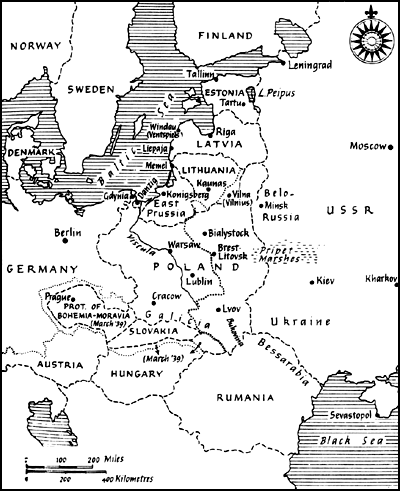Editor of this issue: Saulius Sužiedėlis
Copyright © 1989 LITUANUS Foundation, Inc.

|
LITUANUS
LITHUANIAN QUARTERLY JOURNAL OF ARTS AND SCIENCES
Volume 35, No.1 - Spring 1989
Editor of this issue: Saulius Sužiedėlis ISSN 0024-5089
Copyright © 1989 LITUANUS Foundation, Inc. |

|
ABOUT THIS ISSUE:
A WORD FROM THE EDITOR

"Eastern and Central Europe in 1939." Based on Anthony Read and David Fisher, The Deadly Embrace: Hitler, Stalin and the Nazi-Soviet Pact 1939-1941 (W.W. Norton: New York, 1988), 23.
This year will mark the fiftieth anniversary of the outbreak of the Second World War. Undoubtedly, during the next six years we will be inundated with anniversaries, commemorations, veterans' reunions, survivors' conventions, scholarly symposia and the like, intended to remember the various events of the cataclysm that engulfed the world fifty years ago; it is likely that some people will grow weary of these occasions even before 1995. There is no doubt that to some degree, these anniversaries will be utilized to reaffirm orthodox interpretations of the past that serve political and ideological purposes.
Devoting an entire issue of Lituanus to the treaty that has come to be known as the Molotov-Ribbentrop Pact needs no justification: The German-Soviet Nonagression Pact of 23 August 1939 is clearly one of the decisive turning points of the twentieth century. The Pact and the other public and secret agreements hammered out between the Soviet Union and Nazi Germany between 1939 and 1941 had incalculable consequences for the peoples of Eastern Europe. This is the primary reason why the 49th anniversary of the Pact elicited such an outpouring of public grief and anger in the Baltic States. The sense of injustice, the cries for help, the sorrow at the tremendous cost of the Nazi-Soviet pact for the Baltic nations, the sense of urgency about the future, all this burst forth onto the front pages of the world press. As many as 200,000 gathered at Vingis Park in Vilnius on 23 August 1988 to display an unprecedented sense of national purpose. It would be no exaggeration to say that Lithuania has not witnessed a demonstration of this scope in modern times. Could a fiftieth anniversary, if allowed to convene, be any more impressive?
For the Baltic peoples history is alive in a way that is difficult for many Westerners to understand. In the Baltic perspective, the Molotov-Ribbentrop Pact seems to be an event which is virtually impossible to "put behind us." In at least one sense, it is like the Holocaust, the Armenian genocide and Stalin's mass murders; that is, it exists outside the pale of events which people find easy to forget or forgive. The bureaucratic and seemingly peaceable nature of the pact itself (it was after all a treaty of nonagression) should not prevent us from recognizing it as one of the most violent acts of the period.
Events which elicit massive popular manifestations, or commemorations, create a particularly sensitive problem for historians. An event as the center of commemoration is quite a different phenomenon from an event as an object of historical study. Commemoration, as the word signifies, is intended to reaffirm collective memory, which, in turn, gives meaning to national existence. Inasmuch as commemoration seeks to strengthen group loyalties, it is also a political act. Commemoration is not open to questioning; it can be hostile towards doubt and analysis. Proper historical scholarship, on the other hand, has a different agenda. It cannot function unless it is an individual act and its judgments must be independent of the pressures to conform with group loyalties. Critical examination and, when necessary, revision of the past, which sometimes means undermining cherished misconceptions of history, constitute its core; thus, independent scholarship is often iconoclastic and indeed sometimes unpopular. This does not mean that the historian cannot feel outrage at past injustices or that, as a member of a national community, he or she cannot commemorate the past in a dignified manner. It simply means that a historian, as scholar, cannot adopt group notions of the past when they conflict with his best professional understanding of the historical evidence. Of course, commemoration and historical evidence do not have to clash. But they often do: The problem is an old one and is likely to continue as long as free people write historical works.
This issue of Lituanus tries to present both historical analysis and commemoration. It seeks to present some views on the Pact as an object of historical study, as well as to underline its significance as a commemoration of the tragedy of the Baltic peoples. The research and documentation were supported by the Lithuanian-American Community, as well as the Lithuanian Research and Studies Center. The material here is the core of an expanded publication on the Molotov-Ribbentrop Pact that will appear in the summer of 1989.